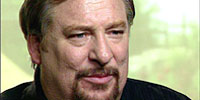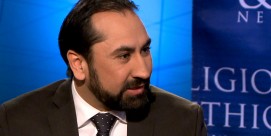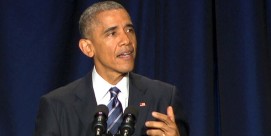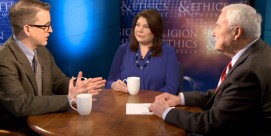In This Episode << SLIDE LEFT TO SEE ADDITIONAL SEGMENTS
Pastor Rick Warren
Read excerpts from Kim Lawton’s August 17, 2008 interview with Pastor Rick Warren at Saddleback Church in Lake Forest, California:
On the August 16 forum with Obama and McCain:
 Rick Warren |
I think it fulfilled the goal that I wanted and the goal was to prove that you could have another model of civil discourse besides the antagonistic debate format. This had never been done before, where you put the two guys on the same stage but have an hour discussion each with the exact identical questions. That’s what allowed them to do apples to apples, you know, comparison, and the amazing thing about it is they both presented their full differences without ever attacking the other person. And I think that was one of the things I wanted to prove, was that we can have returned civility to the civil discourse. We don’t have to be rude. We can disagree without demonizing, caricaturing each other. Both of these men are good men. They love America. They want it to be a good country. They just have vastly different visions on how it will be-how it should be done.
They’re both friends of mine and I know their personality. I know their background. I know-I wasn’t surprised by their stance. In fact, I know-I intentionally limited my follow-up questions so we could-we went broad rather than deep on a couple of issues. And, of course, as a journalist you know this. There are so many times I want to say, “Well, what about …but what about?” And I wanted to go back into the follow-up questions. And I could have with both those guys. I could’ve gone half an hour on each of the questions. But I wanted to give an overview of each of these four big areas: The stewardship of the presidency. What are the responsibilities of the presidency domestically? Personal leadership issues. Of course, the worldview issues of faith and worldview, and then international issues, which are the ones I care about-poverty, disease, illiteracy. There were a number of questions I didn’t get to ask.
On abortion and evangelicals:
I still think for most evangelicals it’s the number one issue, because it’s a life issue. If you literally believe, literally what Psalm 139 says, that “I formed you in your mother’s womb,” I planned your days before you were born, then you believe abortion short-circuits the will of God, that God planned each baby. I talk about this in chapter one of THE PURPOSE-DRIVEN LIFE, that nobody’s an accident. There are accidental parents but no accidental kids; illegitimate parents but no illegitimate kids. Your parents may not have planned you, but God did. And so I don’t believe in accidental births. I believe that God knew what he was doing even in the sin of other people, even that God can bring good out of a rape. I believe that. But if you have a hierarchy, it depends on your worldview. What’s going to be at the top? There’s no doubt about it that if you don’t have that as a value then that’s not going to be at the top and it may be one of a number of different issues. The interesting thing is that every poll shows that the young evangelicals are actually more pro-life than their parents. They’re anti-religious right, but they’re more pro-life, which means they’re saying, “I don’t like the tenor of the argument, and I don’t like some of the other things that they’re saying.” But it doesn’t mean that they’re dropping their commitment to unborn babies.
On evangelical voters:
I’m not a prophet, I’m a pastor, so I can’t predict the future and I can’t predict how people are going to vote. It will be interesting to see how many of them choose to say, “Well, I choose these other issues above the issue of life.” On that particular thing, well, we’ll just have to find out. What I’m hearing is not lock-step in Republicanism. That’s what I’m hearing. I’m not hearing people saying, “Well, I’m going to move away from life,” but I am hearing people saying, “I’m moving away from just pulling a lever in Republicanism.” And, of course, in the last two years, many of the Democrats who got elected were actually pro-life Democrats, and so that’s an interesting combination that we’ll see what happens.
On Democrats, Republicans, and the language of faith:
It’s really interesting because after the 2004 election, a lot of Democratic pundits said they lost-Democrats lost that election because they didn’t speak the language of faith. Well, actually, that’s kind of patronizing, because just because you know the lingo doesn’t mean you have the worldview. And just because somebody can say “Jesus” or “God” or “salvation” doesn’t mean you have the worldview. So what happened, I think, is that everybody went overboard. It was interesting because all of a sudden in the primary season, all the Democrats were talking about God, Jesus, and faith, and all the Republicans were quiet, and they weren’t really wanting to talk about it. They were kind of trying to move away from it, and we’ve actually had more talk about it, obviously, this year than even four years ago. So it’s going to be-it’s just a fascinating season.
I really do think it’s going to come down to not the window dressing of the wording, the faith, the prayers, things like this. It’s going to come down to worldview, and it’s going to come down to individuals saying, “Do I value these particular issues above these particular issues?” I don’t think it’s going to have that big of an effect. I really don’t.
On faith and worldviews:
We must always keep in mind that America’s built on two twin pillars-majority rule and minority rights, and we must believe deeply in both. We believe in majority rule. The minority doesn’t get to make all the rules, and that means the majority wins. That means sometimes I lose. I lost on abortion. Okay. Abortion is the law in our land right now. I don’t agree with it, but my minority wasn’t strong enough to overturn that. On the other hand, we don’t just believe in ignoring minority rights, and so I think it’s very important that the candidates not only express their faith and express their worldview, if they have a worldview or have a faith, everybody’s got a worldview, but it’s also they have to make people feel comfortable to understand, “I am the president of everybody.” That’s extremely important. When I go to the doctor, I don’t ask a surgeon, “Are you an evangelical?” I say, “Are you a good doctor?” And the same is true with the president. It’s trite to say it but he’s not the pastor of the United States; he’s the president. And so I think it’s important for Christians, evangelicals, and people of faith to stand up and say, “Yes, we don’t have any problem with faith being at the table. What we have a problem with is a theocracy. I don’t believe in theocracy. I don’t believe in state church. I believe the reason Christianity has flourished in America is because it’s a free-market society and may the best idea win. I think everybody-I think a Muslim ought to have the right to try to persuade me to accept that faith as much as a Hindu or a Jew or anybody else, and likewise. I believe in persuasion. I do not believe in coercion.
On church-going voters:
Well, it is an interest group. Sorry to say that, but it is an interest group, and it happens to be probably the largest interest group. Unions are an interest group. Teachers are an interest group. Gays are an interest group. So should only other interest groups be allowed to have the candidates come to their venues? Now the candidates will go to gay venues, they’ll go to union venues, they’ll meet with teacher’s unions. They’ll do all different kinds of things. So a large portion of America goes to church. I mean, you know, this weekend about 140 million people will be in a church. Now more people will go in a church in one weekend than attend all professional sporting events in a year. I’m not talking about television. I’m talking about going to a tennis match, a ball game, baseball, football. So we have a sports page in the paper every day of the week, and only a tiny fraction of America pays attention to sports. There are far more people who are paying attention to what is going on in their church than pay attention to sports. So, as they’ve said before, we don’t believe in the naked public square. We believe in everybody being there at the table, and so I think it’s entirely appropriate as long as you don’t create a religious test.
On pro-life issues:
I’m certainly pro-life. There’s no doubt about that. But I’m also pro-whole-life, as they say, and I want to see commitments to-it’s why I challenged both of the candidates at the forum the other night about a challenge to do for orphans what President Bush had done for PEPFAR [President’s Emergency Plan for AIDS Relief]. There are 30 million people in the world with AIDS right now who need ARVs [antiretroviral treatments] and things like that. But there are 143 million orphans in the world who are growing up without parents.
On issues at stake in the 2008 election:
We’ve got a number of things at stake. We cannot forget that we really still are at war. There are people in this world who want to destroy America. They’re not a significant part of the world, but they are a dedicated and radical part of the world, and they are bent on the destruction of America. So the war on terrorism is a hard war, because terrorism is actually a tool. You can’t have a war on a tool. In the past we had a war on an enemy, and we knew who the enemy was. You might be able to have a war on terrorists, but terrorism is actually a tool, and how do you defeat a tool? But that’s going to be a constant issue. I mentioned this the other night in the forum-there’s this collision between personal rights and the need for security, and that is not an easy answer. Now which takes precedence in the freedom that we’ve enjoyed for so long? I mean, every time I go through an airport I think, one guy changed my life. You know, I have to take off my shoes and my belt because of one guy, and that’s the power of terrorism. So the security issue is a big deal. The rebuilding of our inner cities is a big deal. Infrastructure is a big deal. I mean, I could go on and on and start sounding like a politician. So I would say that I’m more pleased about the two candidates this year than we’ve had in a number of years. I think they’re both genuinely competent people, and I would not agree, if either of them got elected, would not agree with everything they did. But they are both competent.







